|
|
|
Sort Order |
|
|
|
Items / Page
|
|
|
|
|
|
|
| Srl | Item |
| 1 |
ID:
115037
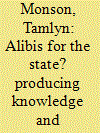

|
|
|
|
|
| Publication |
2012.
|
| Summary/Abstract |
This paper examines the production of knowledge about the causes of the May 2008 attacks on foreign nationals in South Africa, embodied in state actors' recourse to discursive tropes of a 'third force' or mere 'criminality' in explaining the attacks. It explores the way in which this 'knowledge' reproduced statist notions of territory and power in the wake of a cataclysm that destabilised conventional notions of the congruence of nation, state and territory. The paper shows how official explanations of the attacks served both to camouflage the internal borders made visible by localised conflagrations and to reassert the state as the exclusive author of territorial borders.
|
|
|
|
|
|
|
|
|
|
|
|
|
|
|
|
| 2 |
ID:
115045
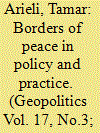

|
|
|
|
|
| Publication |
2012.
|
| Summary/Abstract |
Border-management policies are designed to balance national interests of border control with the costs of monitored cross-border interaction. These policies, formulated by national authorities, are often based on constructed definitions and interests of national security rather than wider understandings of the components of human security. This is especially evident in post-conflict borders where local initiatives of economic, social and environmental cross-border interaction are posed to contribute to regional stability and security. This article analyzes civilian cross-border cooperation in the southern section of the Israel-Jordan border region, distinguishing between local and national perspectives regarding border management. Focusing mainly on Israel's policies the article demonstrates how despite the vision of good neighbourly relations and their potential contribution towards regional prosperity and stability, local cross-border initiatives have been inhibited in the name of national security. The case study demonstrates the mechanisms and ramifications of exclusive securitisation policies of post-conflict border management.
|
|
|
|
|
|
|
|
|
|
|
|
|
|
|
|
| 3 |
ID:
115036
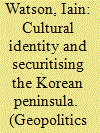

|
|
|
|
|
| Publication |
2012.
|
| Summary/Abstract |
The paper discusses South Korea's 'brand Korea' initiative and the impact of cultural transformations on the South Korean national security narrative. The paper considers the practices of identity and security representation in South Korea and outlines how cultural transformations in a country which has built its national security on an assumption of racial and ethnic homogeneity are affecting relations between South and North Korea. The paper argues that these issues can be explored through a critical geopolitics perspective and that the key relationship resides in the narratives and representations of threat and 'the foreigner.' The paper discusses critical geopolitics within a non-Western context and explores how cultural transformations are creating new narratives and new representations of the relationship between foreigner, national identity and national security.
|
|
|
|
|
|
|
|
|
|
|
|
|
|
|
|
| 4 |
ID:
115042


|
|
|
|
|
| Publication |
2012.
|
| Summary/Abstract |
An important issue today is the compatibility of agricultural frontiers, which are driven by economic objectives, with conservationist views. In the Amazon, family farmers are concerned with this issue since they are at the same time actors of the agricultural frontier and considered as potential actors of the preservation of the forest. Through the study of a highly symbolic settlement project in the State of Pará, this paper focuses on the role that family farmers can play in meeting sustainability goals. The central argument which is developed in this paper is that this objective may be achieved when projects do not presuppose social and spatial relationships; rather, it advocates an approach which is attentive to place-making processes.
|
|
|
|
|
|
|
|
|
|
|
|
|
|
|
|
| 5 |
ID:
115039


|
|
|
|
|
| Publication |
2012.
|
| Summary/Abstract |
In recent years several important books have argued that the United States of America, China, Russia and even the European Union "look, talk and walk" like empires. However, these books have failed to impress those working in the field of international relations. For some, the Westphalian state is still the major unit of analysis. Others prefer to use the terms "great powers" or "hegemony." This research note will, first, try to assess the added value that the concept of empire brings to the study of international relations. The second aim is to establish how best to study contemporary empires. Which actors can be classified as empires? Should one focus on imperial structure, mission or behaviour? The third objective is to seek ways of identifying patterns of cooperation and competition among empires. Can the contemporary manifestations of empire co-exist without major conflict?
|
|
|
|
|
|
|
|
|
|
|
|
|
|
|
|
| 6 |
ID:
115040


|
|
|
|
|
| Publication |
2012.
|
| Summary/Abstract |
South Africa has experienced two periods of contrasting nation-building, with apartheid's exclusionary ideology of separate development contrasting with the inclusive nationhood discourse of the democratic period. Throughout these periods, the South African government has utilised iconography within the cultural landscape in efforts to promote the changing national narrative to domestic and international audiences. Analysis of postage stamps issued by the South African government during and after apartheid demonstrate the continuing evolution of nationalism and identity. The appropriation of the iconographic power of postage stamps by the ANC, through their production of propaganda postage labels during the 1980s, reinforces the importance of such ephemeral, quotidian objects while complicating national narratives presented in official philatelic issues.
|
|
|
|
|
|
|
|
|
|
|
|
|
|
|
|
| 7 |
ID:
115044
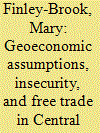

|
|
|
|
|
| Publication |
2012.
|
| Summary/Abstract |
The Central American Free Trade Agreement (CAFTA) exemplifies interconnections and contradictions between geopolitical and geoeconomic agendas, including security, democracy, and resource marketing. Central American sovereignty is selectively weakened as states are increasingly dependent on the US and must synchronise governance with the expectations of their most important trade partner or risk becoming defendants in international tribunals. Salvadoran and Costa Rican governments have been accused of upholding environmental regulations that impede the profit-earning of multinational corporations, while the Guatemalan state was charged with violating domestic labour laws. Nevertheless, criminal behaviour and impunity are widespread across the region and seldom provoke US action. Five years after CAFTA's implementation, there is evidence of the erosion of democracy, repression of civil society, and uneven distribution of trade costs and benefits. These results have led some analysts to conclude CAFTA must be renegotiated, while others recommend human and labour rights protocols accompany free trade agreements.
|
|
|
|
|
|
|
|
|
|
|
|
|
|
|
|
| 8 |
ID:
115038
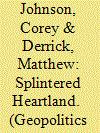

|
|
|
|
|
| Publication |
2012.
|
| Summary/Abstract |
Much has been made about a revival of Mackinderian geopolitics in Eurasia, largely centred on struggles over access to energy resources and rooted in a territorial understanding of space. This paper proposes that the conceptual political cartography of Eurasia is indeed largely being rewritten, but conventional understandings of space, territory, and resources are insufficient in providing insight into a changing geopolitics. We interrogate the geographical logics of Russia's role as energy provider to Europe by focusing specifically on the provision of gas to Europe via Nord Stream, a new underwater pipeline that is scheduled to go online by late 2011. Drawing on debates in human geography on relational/topological views of space, and on the "splintering urbanism" thesis, the paper describes a rapidly evolving networked space that effectively "splinters" the territorial integrity of the region and thereby complicates notions of Eurasian geopolitics that emphasise proximity, territorial hegemony, and state-centric international relations.
|
|
|
|
|
|
|
|
|
|
|
|
|
|
|
|
| 9 |
ID:
115041


|
|
|
|
|
| Publication |
2012.
|
| Summary/Abstract |
Trajectories are defined as constructs used in geopolitical discourses at all levels - formal, practical and popular. Each trajectory consists of a particular scaling of here, a particular scaling of there, and a particular causal hypothesis about how the two are linked. Norwegian discourses about the 2009 Nobel Peace Prize provide examples of trajectories. These discourses reveal certain assumptions about the motives and outcomes framed in terms of trajectories, as well as closely associated types of emotion and affect. By employing the concept of the trajectory, geographers can better understand geopolitical discourses, their construction of scale and causality, as well as their dependency on the in-between spaces of emotion and affect.
|
|
|
|
|
|
|
|
|
|
|
|
|
|
|
|
| 10 |
ID:
115043
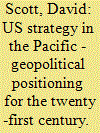

|
|
|
|
|
| Publication |
2012.
|
| Summary/Abstract |
This article seeks to apply IR theory to the US presence in the Pacific. It analyses the ways in which geopolitical considerations of position are at the heart of US security strategy in the Pacific. It argues that America's long-term security position in the Pacific is a basic geopolitical matter; be it in terms of traditional geopolitics (regional position as "location") and in terms of critical geopolitics (regional position as "power and aspirations"). In looking at US security strategy in the Pacific, three geopolitical features are noticeable: (1) Mahanian seapower tenets, (2) overlapping competitive US-China concerns focused around the two island chains in the Western Pacific, and (3) the internal balancing carried out by the US in the Pacific which is particularly focused on Guam.
|
|
|
|
|
|
|
|
|
|
|
|
|
|
|
|
|
|
|
|
|